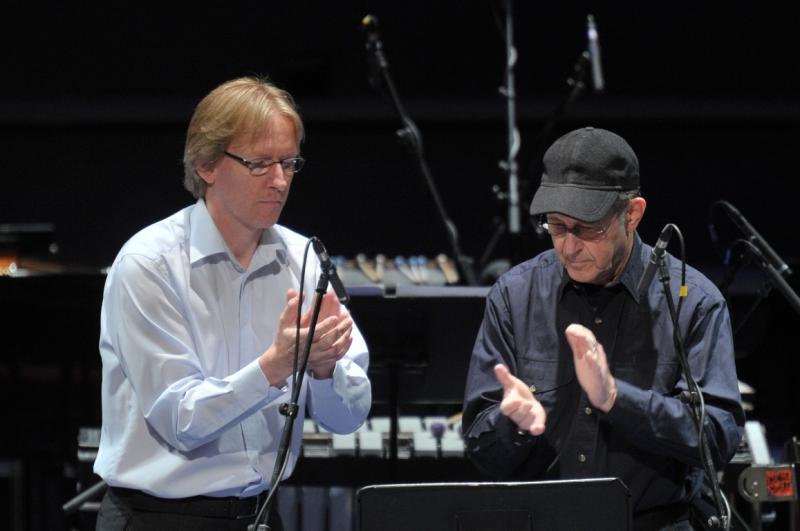BBC Proms: Ensemble Modern, Steve Reich | reviews, news & interviews
BBC Proms: Ensemble Modern, Steve Reich
BBC Proms: Ensemble Modern, Steve Reich
Minimalist modern classics go down a storm at first Proms performance

One thing became clearer to me last night – just how much Steve Reich has borrowed from world music in his compositions – we had the flamenco-tinged Clapping, Electric Counterpoint, using Central African guitar lines, and Music for 18 Musicians, a mix of West African rhythms, Indonesian gamelan and other elements.
Clapping, from 1972, was also, of course, a clever piece of conceptual art – isn’t clapping what audiences do? But it would be hard to overestimate the impact the piece had among fellow composers like Michael Nyman and John Adams. After the over-intellectual cult of atonality that came before it, here was a call to simplicity, back to the most human of instruments possible, the hands. Permission was granted to reclaim primal musical delight in a way that was not nostalgic. The fact that the acoustics of the Albert Hall rather ruined the impact didn’t matter as it was only five minutes long. It was more of an homage to a pivotal piece with Reich and Rainer Römer on stage clapping each other, making it look simple when in fact the elements fitted together like a Rubik's Cube, easy enough after years of practice but fiendish for the unwary.
A 15-minute piece from 1987, Electric Counterpoint was played with unflashy aplomb by Swedish guitarist Mats Bergoström making his Proms debut on what looked like a vintage Gibson electric in a Pat Metheny style (the piece was apparently partly inspired by Metheny’s open ostinato playing) to seismic layers of backing track. It was also very soukous influenced – the sound of 1970s Zaire, as it then was. The problem for me was the chord progressions, which showed Reich wandering all over the place. By the mid-Eighties most of the Minimalists had given up being minimal, which to my mind was a failure of nerve. Or a bit like a mosque saying, "Oh well, let’s have a few pictures of the Prophet Mohammed in after all and undercut the mystique."
The centrepiece was Music for 18 Musicians (1974-6) which, at nearly an hour, is the best argument for Reich there is. The forward propulsion is mesmeric, the shifting horizons at times vertiginous, and, above all, its positivity is extraordinary. It was music for the dawn of a new age, collectivist in nature (no stars), a trance/healing music that required a different way of listening, in that the repetition draws you in to the minutiae of the patterns. I wonder when a composer will be able to summon up such optimism again.
It kept up the almost tantric tension throughout. As far as how well it was played, it seems that as long as the notes are played correctly it’s more a case of collective feel and groove rather than anything else than makes the piece work. The fact that the Ensemble Modern clearly knew the piece well and are Reich specialists made the strings, clarinets and marimbas and xylophones lock in perfectly. Reich himself played understated piano stage right. The other essential element, beyond the mathematical conundrums, is the pulse, making the piece breathe like a Leviathan. If they repeated it at the Albert Hall they might look again at some of the dynamics as the sound was a little muddy and unfocussed at times, but even that seemed to add a not unwelcome element of psychedelia to what actually is a rigorous piece.
It’s also interesting with hindsight to see it of its time – of a 1970s New York that was at a musical creative peak. Within a few miles and years funk was developed, as was punk, disco, hip hop and salsa, all of which were to go global, and the world of high and low art intermingled in a way not seen since Paris in the 1920s. The piece manages to be both intellectual, with little funky off-beats, and somehow spiritual, jumping into something oceanic as though a Zen riddle had been solved (the sound of one-hand clapping?). The edge-of-frame vocals by the alto and sopranos of Synergy Vocals added to the Shangri-La feel of a timeless, newly discovered zone. Mixed in with the global influences, Reich has pointed to the Parisian master Perotin, from eight centuries ago, who stretched out plainsong melodies to breaking point. The fact that it was the first performance (as it was for Electric Counterpoint) at the Proms seemed rather remarkable – the audience roared approval: here was modern(ish) music that was totally pleasurable without being in the slightest bit sentimental or kitsch.
Explore topics
Share this article
Add comment
The future of Arts Journalism
You can stop theartsdesk.com closing!
We urgently need financing to survive. Our fundraising drive has thus far raised £49,000 but we need to reach £100,000 or we will be forced to close. Please contribute here: https://gofund.me/c3f6033d
And if you can forward this information to anyone who might assist, we’d be grateful.

Subscribe to theartsdesk.com
Thank you for continuing to read our work on theartsdesk.com. For unlimited access to every article in its entirety, including our archive of more than 15,000 pieces, we're asking for £5 per month or £40 per year. We feel it's a very good deal, and hope you do too.
To take a subscription now simply click here.
And if you're looking for that extra gift for a friend or family member, why not treat them to a theartsdesk.com gift subscription?

Comments
...
...
...